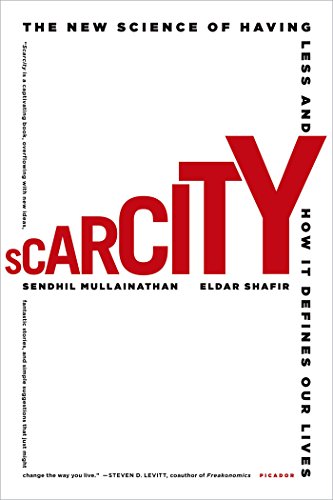Book Review: Scarcity
Published:
Economics is the study of scarcity. Scarcity is the title and subject of a new book by Eldar Shafir and Sendhil Mullainathan, an book with powerful and new ideas that extend beyond economics to psychology, public finance, and sociology. Drawing on existing and original research from around the world, Mullainathan and Shafir reframe our understanding of poverty by showing that scarcity in and of itself can unusually influence decision-making.

Here’s the paperback.
Utility: ⭐⭐⭐⭐⭐ (5/5)
The content meets the expectations set by the ambitious title. Mullainathan and Shafir have documented a systematic but previously overlooked psychological phenomenon and provided a novel lens to analyze public policy. The theoretical section explains and justifies ideas, packed with research from the mall, the hood, and the slums of India. The policy analysis section could have been longer, but it nonetheless communciates important ideas for policymakers.
Writing: ⭐⭐⭐⭐⭐ (5/5)
The writing was splendid. The authors have a talent for speaking to a general audience. The stories were both intellectually compelling and genuinely touching. Although the theory occasionally slows down, it never felt annoying or boring.
Notes
Scarcity
Scarcity is the feeling someone has when they have less of a resource than they perceive they need. While scarcity is most obvious for time and money, other resources - from food (for dieters) or friends (for loners) - can also be scarce.
The Upside
Individuals under scarcity experience an important advantage: the focus dividend. They become adept at the task at hand, i.e. managing the scarce resource. In field studies, people in poverty are better at making “rational” monetary assessments and avoiding behavioral issues common among the wealthy. However, the narrow upside is outside by…
The Downsides
There are two negative consequences of scarcity. The first is tunneling. People focus on the task at hand at the expense of other issues. For example, an Indian farmer focused on finding money to buy a gift for a family friend won’t think 1 year down the line. As a result, they make suboptimal spending decisions that keep them in debt.
The second cost is the bandwidth tax. Scarcity inhibits mental capabilities writ large, including fluid intelligence and executive control. One study found that simply inducing the poor to think about a $1,000 expense causes them to lose 13-14 IQ points on a subsequent test, an effect that doesn’t exist for the rich.
Traps
Everyone experiences shocks in life. A relative may pass away or a natural disaster may cause damage. The wealthy can weather these shocks because they have slack - an excess of resources. When they make a poor purchase, they aren’t forced to borrow.
The poor, who lack slack, have to borrow money whenever a shock hits. And, just as they resolve one crisis, they have to address the next, borrowing yet again. The end up juggling crisis after crisis.
Policies
The poor are not poor (exclusively) because of their character. They are poor in part because being poor itself imposes psychological costs that inhibit planning, critical thinking, and self-control.
Policies can seek to decrease the cost of inattentiveness by making smart defaults, like automatic saving schemes. Programs can also bring good decisions inside the tunnel. One program partnered with banks to give shoppers at a supermarket the chance to buy “savings cards” at the till, which would deposit money into their savings account. Nudge-style interventions are an appropriate response to these unique behavioral issues.
